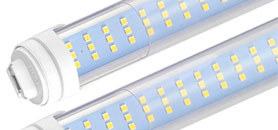Frequently Asked Questions
We've listed many of the questions we're asked most often. Still have questions? Fee free to contact us!
- Q. Can you install recessed “can” lights in my high-vaulted ceiling?
- Yes, if there is enough attic space between the ceiling and the roof.
- Q. I bought a hot tub. Will my electrical panel handle it?
- Generally if you have at least a 200 amp main breaker panel with spare breaker space left, your panel should handle a hot tub. Consult an electrician to make sure.
- Q. I bought an air conditioner and can I plug it into any receptacle in the house?
- No! You must first find out the amperage of the new AC unit and compare it with the available receptacle circuit. Most AC unit manufacturers recommend a dedicated circuit and so do we.
- Q. I bought an electrical space heater. Can I plug it into any receptacle in my house?
- We believe that up to a 1000 watt space heater would be okay to plug into any receptacle. But it is best to consult an electrician and install a dedicated circuit.
- Q. Why are my lights throughout the house dimming/getting brighter when I operate my stove, or hair dryer, or iron?
- This is an indication of a high resistance connection somewhere in you electrical system. It is very important to get help from a licensed electrician immediately.
- Q. What should I do about a circuit breaker that keeps popping off?
- If a breaker “pops” off more than once and you cannot determine what the load is that is causing it to “pop” off, you need to have a licensed electrician determine what the problem is.
- Q. Why do I need GFCI receptacles?
- Because GFCI (Ground Fault Circuit Interrupt) receptacles are for your protection and required by code.
- Q. Should I be concerned that my dimmer control switch is warm to the touch?
- Most dimmers do get warm but if you feel it may be too warm, consult a licensed electrician.
- Q. I hear crackling sounds from my panel. Is that a problem?
- Any crackling, popping, or humming sounds coming from your electrical panel is reason for immediate concern and a licensed electrician should be called as soon as possible.
- Q. I don’t have any hot water. Should I call an electrician or a plumber?
- If your hot water tank is more than 10 years old and you are not experiencing any other electrical problems in your home, call a plumber. Your tank probably has a problem.
- Q. Are surge protectors important?
- Yes, a good whole house surge protector will protect your valuable electronic equipment from high voltage spikes coming from outside your home, but you also need individual surge protectors on each unit to protect against voltage spikes generated inside your home.
- Q. Why does it pop a circuit breaker when I run my microwave and toaster at the same time?
- Circuit breakers are designed to turn off when there is too much electricity flowing through the wires. Both a microwave and a toaster require large amounts of electricity to operate.
- Q. Why should I change out my Federal Pacific, Stablock, Murry, Bulldog, or Zinsco electrical panel?
- These panels have proven themselves over the years to be unsafe and have caused many home fires.
- Q. Why do I need to have three prong receptacles?
- Three prong receptacles are much safer because there is a ground wire present to help activate the circuit breaker if there is a problem in the circuit.
- Q. Is that cloth covered wiring in my attic safe?
- As long as the wire is protected by a properly sized breaker and has not been damaged it should be safe. If you are in doubt, have a licensed electrician inspect your wiring.
- Q. When I’m running my electrical space heater and I run my vacuum cleaner it pops the breaker. Why does it do that?
- Breakers limit the amount of electricity that can safely go through the wires. If you try to operate devices require more electricity than the wire can handle, the breaker will turn off.
- Q. What’s wrong with using an adapter that allows me to plug my three prong device into a two prong power outlet?
- There are two problems with these adapters: 1) They are seldom properly grounded, and 2) They add another connection that can overheat and cause problems.
- Q. Why should I not plug my freezer into an outlet with GFCI protection on it?
- GFCI receptacles are designed to sense fluctuations in power. They are safety devices. The motor on freezers will spike the draw of electricity when it first turns on and if the circuit is GFCI protected, that GFCI device will often turn off the power to that circuit when it senses the spike. If you have a freezer plugged into a GFCI and it trips off, you run the risk of having the contents thaw and spoil.
Save Energy, Save Money - Here's How!
Upgrade Lighting

Do you have the old-style magnetic ballast, large tube fluorescent light fixtures in your home or business? You can recognize them because they have a hum when they are operating. These fixtures can be retrofitted with electronic ballasts and energy efficient lamps and begin saving money in energy savings. Call Axis Electric to come out and quickly retrofit your old lighting.
EnergyTrust Funds

There may be EnergyTrust funds available for help in defraying the cost of retrofitting your building. The program requires that an audit be done ahead of time to evaluate the types of light fixtures and the number. Then an application is filled out and turned into the EnergyTrust and you are told, ahead of time, what funds may be available to you.
Tax Credits

If you check with your power company they can tell you if there are tax credits available for you from the State of Oregon and the U.S. Government for upgrades to more energy efficient electrically powered devices, like a new furnace or heat pump.
Solar Tax Incentives

There are tax credits and EnergyTrust funds available for people to install solar systems. The savings for commercial installations are especially attractive. The initial cost is invested by the building owner, but the tax credits, EnergyTrust funds and energy savings can often be equal to the initial investment.
